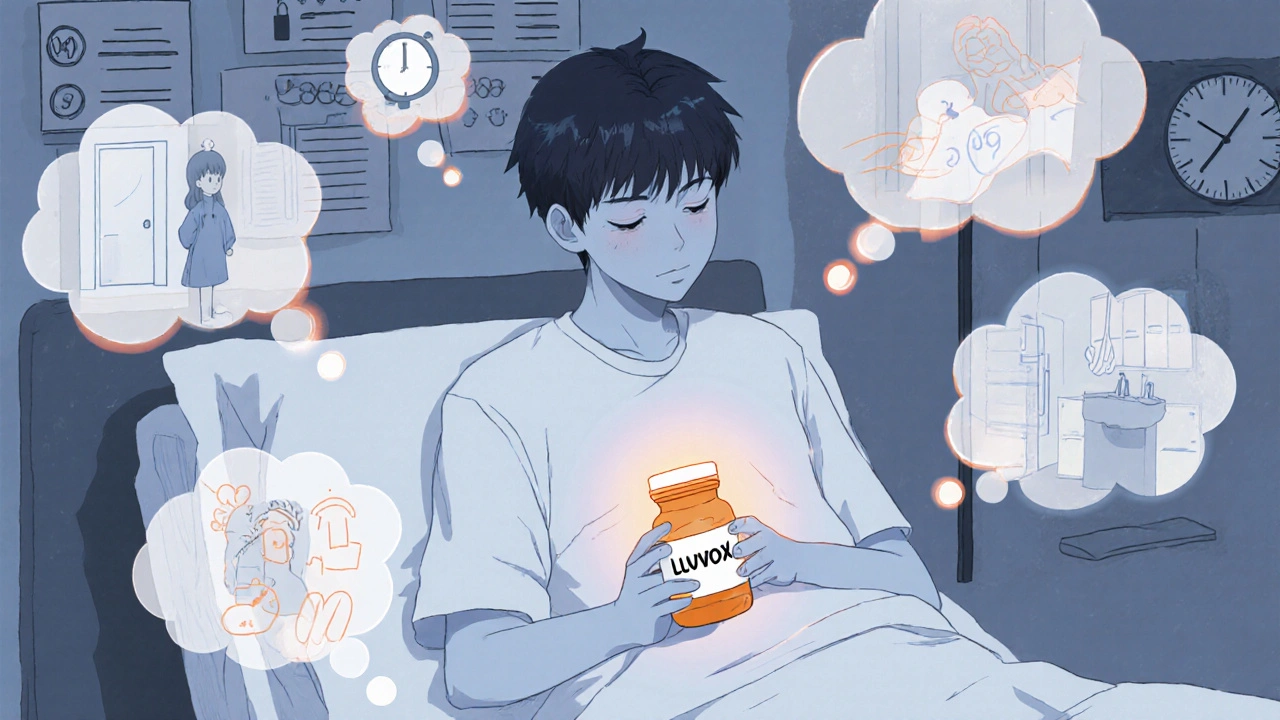SSRI Comparison Tool
Find the Best SSRI for Your Needs
This tool compares Luvox (fluvoxamine) with other common SSRIs based on your specific symptoms, medication interactions, and side effect profile.
SSRI Comparison Results
Based on your selection:
| Medication | Primary Use | Onset of Action | Drug Interactions | Side Effects | Withdrawal Risk |
|---|
When you’re prescribed Luvox (fluvoxamine), it’s not because your doctor picked it randomly. It’s usually because you’re dealing with OCD, severe anxiety, or sometimes depression that hasn’t responded to other meds. But here’s the thing: Luvox isn’t the only option. In fact, most people end up trying at least two or three antidepressants before finding one that fits. So how does fluvoxamine stack up against the others? And if it’s not working-or causing too many side effects-what should you try next?
What is Luvox (fluvoxamine) actually used for?
Luvox is a selective serotonin reuptake inhibitor (SSRI) approved by the FDA primarily for treating obsessive-compulsive disorder (OCD) in adults and children over 8. Also known as fluvoxamine, it was first approved in the U.S. in 1994 and has since been used off-label for social anxiety disorder, panic disorder, and treatment-resistant depression.
Unlike some SSRIs that are more general-purpose, Luvox has a stronger effect on serotonin reuptake in certain brain pathways tied to compulsive thoughts. That’s why it’s often the first SSRI doctors reach for when OCD is the main issue. Studies show about 50-60% of people with OCD see meaningful improvement with Luvox, usually after 6-12 weeks of consistent use.
But Luvox isn’t perfect. It interacts with a lot of other medications because it blocks the liver enzyme CYP1A2. That means if you’re on asthma inhalers, caffeine-heavy drinks, or certain painkillers, your body might process them too slowly-leading to side effects like jitteriness, nausea, or even heart rhythm changes. For some, this makes it harder to tolerate than other options.
How Luvox compares to Prozac (fluoxetine)
Prozac is one of the most well-known SSRIs. It’s used for depression, OCD, panic disorder, and even bulimia. Like Luvox, it’s effective for OCD-but it has a much longer half-life. That means fluoxetine sticks around in your system for weeks after you stop taking it.
This can be good or bad. On one hand, if you miss a dose, Prozac’s long stay in your body helps prevent withdrawal symptoms. On the other, if you need to switch meds quickly or have side effects, it takes much longer to clear out. Luvox clears in about 1-2 days, so it’s easier to adjust or stop.
Prozac is also less likely to interfere with liver enzymes, so it plays nicer with other drugs. If you’re on multiple medications-like beta-blockers, statins, or even over-the-counter sleep aids-Prozac is often a safer bet. But Prozac can cause more activation: insomnia, restlessness, or increased anxiety early on. Luvox tends to be more sedating, which some people prefer, especially if they struggle with sleep.
Luvox vs. Zoloft (sertraline): Which is better for anxiety?
Zoloft is the most commonly prescribed SSRI in the U.S. for both depression and anxiety disorders. It’s approved for OCD, social anxiety, panic disorder, PTSD, and generalized anxiety. And unlike Luvox, Zoloft doesn’t have major drug interactions. That’s a big plus for people managing multiple conditions.
Studies comparing Luvox and Zoloft for OCD show similar effectiveness. But Zoloft wins in real-world use because it’s better tolerated. Fewer people quit Zoloft due to side effects. Common side effects for both include nausea, drowsiness, and sexual dysfunction-but Zoloft’s side effects tend to be milder and fade faster.
If you have social anxiety, Zoloft is often the first-line choice. It’s been studied more broadly across anxiety types. Luvox? It’s mostly used when OCD is the primary issue. If you’re dealing with both depression and social anxiety, Zoloft covers more ground without needing extra meds.

How does Lexapro (escitalopram) compare?
Lexapro is the S-enantiomer of citalopram-basically, the more active half of the molecule. That means it’s more potent at lower doses. It’s approved for depression and generalized anxiety disorder (GAD), but not OCD. So if your main problem is OCD, Lexapro isn’t your best bet.
But if you have GAD, panic attacks, or depression with high anxiety, Lexapro often works better than Luvox. Clinical trials show it has a faster onset of action-some people feel calmer within 1-2 weeks. Luvox can take 6-8 weeks to show full results.
Lexapro also has fewer drug interactions than Luvox. It doesn’t block CYP1A2 significantly, so it’s safer with caffeine, alcohol, and common pain relievers. Side effects are similar: nausea, fatigue, and occasional sexual side effects-but fewer people report weight gain or dizziness with Lexapro.
For most people with anxiety (but not OCD), Lexapro is the go-to. For OCD, Luvox still holds its ground.
What about Celexa (citalopram) and Paxil (paroxetine)?
Celexa is the older version of Lexapro. It’s less potent, so you need higher doses. But it’s cheaper and works fine for depression and anxiety. It doesn’t interact with CYP1A2 like Luvox does, so it’s easier to combine with other meds. However, higher doses of Celexa can affect heart rhythm, so doctors monitor QT intervals.
Paxil is another option. It’s effective for OCD, panic disorder, and social anxiety. But it’s also the SSRI most likely to cause weight gain and sexual dysfunction. It’s also the hardest to stop-withdrawal symptoms like dizziness, brain zaps, and nausea are common. Luvox has milder withdrawal, but Paxil works faster for some people with severe anxiety.
Here’s a quick comparison:
| Medication | Primary Use | Onset of Action | Drug Interactions | Common Side Effects | Withdrawal Risk |
|---|---|---|---|---|---|
| Luvox (fluvoxamine) | OCD | 6-12 weeks | High (CYP1A2) | Nausea, drowsiness, insomnia | Moderate |
| Prozac (fluoxetine) | OCD, depression | 4-8 weeks | Low | Insomnia, jitteriness, weight loss | Low |
| Zoloft (sertraline) | OCD, social anxiety, panic | 4-8 weeks | Low | Nausea, diarrhea, sexual dysfunction | Moderate |
| Lexapro (escitalopram) | Depression, GAD | 2-4 weeks | Low | Nausea, fatigue, dizziness | Mild |
| Paxil (paroxetine) | OCD, panic, social anxiety | 4-6 weeks | Low | Weight gain, sexual dysfunction, drowsiness | High |

When should you avoid Luvox?
Luvox isn’t for everyone. You should avoid it if:
- You take theophylline (for asthma), clozapine (for schizophrenia), or tizanidine (a muscle relaxant)-these can build up to dangerous levels.
- You drink more than 2-3 cups of coffee a day. Luvox slows caffeine breakdown, leading to heart palpitations or panic-like symptoms.
- You’ve had a bad reaction to other SSRIs, especially nausea or sexual side effects. Luvox has similar risks.
- You’re pregnant or planning to be. While SSRIs are generally considered low-risk, Luvox has less safety data than Zoloft or Lexapro.
- You’re on blood thinners or anti-seizure meds. Interactions can be unpredictable.
Also, Luvox isn’t approved for children under 8 or for bipolar depression. If you have bipolar disorder, an SSRI alone can trigger mania. Mood stabilizers like lithium or lamotrigine are usually needed first.
What if Luvox doesn’t work?
One in three people don’t respond to the first SSRI they try. That’s normal. If Luvox hasn’t helped after 10-12 weeks at a full dose (usually 100-300 mg/day), it’s time to switch.
Most doctors will try one of these next:
- Zoloft - if OCD is still the main issue, but you need fewer drug interactions.
- Lexapro - if anxiety or depression is more prominent than compulsions.
- Clomipramine - a tricyclic antidepressant, not an SSRI. It’s actually more effective than SSRIs for OCD, but has more side effects like dry mouth, constipation, and dizziness.
- SNRIs like Effexor (venlafaxine) - if serotonin alone isn’t enough. These also boost norepinephrine.
- Therapy - CBT (cognitive behavioral therapy), especially exposure and response prevention (ERP), is just as effective as medication for OCD. Many people do better with both.
Don’t rush to switch. Give each med at least 6-8 weeks at the right dose. But if side effects are unbearable-like severe nausea, sleeplessness, or suicidal thoughts-talk to your doctor right away. You don’t have to suffer through it.
Bottom line: Is Luvox still worth it?
Yes-if your main problem is OCD and you don’t have other meds or caffeine-heavy habits. Luvox is still one of the most targeted SSRIs for compulsive behaviors. But for most people with general anxiety, depression, or multiple health issues, Zoloft or Lexapro are safer, easier, and just as effective.
There’s no single ‘best’ antidepressant. What works for your neighbor might make you feel worse. The key is matching the drug to your specific symptoms, lifestyle, and other medications. Luvox has a place-but it’s not the default anymore. It’s a precision tool, not a first-aid kit.
If you’re on Luvox and it’s working, great. Stick with it. But if you’re struggling with side effects or it’s not helping, don’t assume you’re broken. You just haven’t found the right fit yet. There are options. And you deserve to feel better.
Is Luvox stronger than Zoloft for OCD?
Studies show Luvox and Zoloft are equally effective for OCD when taken at appropriate doses. Luvox may have a slight edge in severe cases, but Zoloft is better tolerated and has fewer drug interactions, making it easier to use long-term.
Can I drink coffee while taking Luvox?
It’s not recommended. Luvox slows down how your body breaks down caffeine, which can lead to jitteriness, rapid heartbeat, or panic attacks. If you drink coffee, reduce it to one cup a day or switch to decaf. Some people need to cut it out entirely.
Does Luvox cause weight gain?
Luvox is less likely to cause weight gain than Paxil or mirtazapine, but some people still gain 5-10 pounds over time. It’s not as common as with other SSRIs, but it’s possible. Monitoring diet and activity helps.
How long does it take for Luvox to start working?
Most people start noticing improvements in OCD symptoms after 4-6 weeks, but full effects can take 8-12 weeks. Don’t give up before then-unless side effects are severe.
Can I switch from Luvox to Lexapro safely?
Yes, but not cold turkey. Your doctor will likely taper Luvox over 1-2 weeks and start Lexapro at a low dose. Because both affect serotonin, there’s a small risk of serotonin syndrome if you overlap them too much. Always follow your doctor’s plan.

7 Comments
Luvox was the only thing that quieted my OCD loops when nothing else worked. I was on Zoloft for a year and barely moved the needle. Then my psychiatrist switched me-sudden, scary, but worth it. The caffeine thing? Real. I had to quit my morning espresso habit cold turkey. No joke, my heart was racing like I’d downed three Red Bulls. But after two months, the mental noise just… stopped. I don’t take it lightly, but it saved me.
Side effects? Yeah. Nausea for the first two weeks. Drowsiness in the afternoons. But I’d rather be tired than trapped in my own head.
Not for everyone. But if you’ve tried everything else? Give it a real shot. Not a week. Not a month. At least ten weeks. Your brain needs time to rewire.
And yes, therapy helped too. ERP was brutal, but Luvox made it bearable.
Luvox made me feel like I was drowning in syrup. Every morning felt like dragging myself through wet cement. I didn’t care how well it worked-I couldn’t live like that.
Let me tell you something they don’t want you to know about Luvox-Big Pharma doesn’t push it because it’s generic and they can’t charge $200 a pill. That’s why doctors act like it’s some mystical cure-all. It’s not. It’s just the old guy in the back who still works, but nobody wants to admit it.
And the caffeine thing? Please. That’s just the tip of the iceberg. Did you know Luvox can interfere with your thyroid meds? Or that it’s been linked to serotonin syndrome in people who take melatonin? I read a paper once-peer-reviewed, mind you-that said it might even mess with your gut microbiome long-term.
And don’t get me started on the ‘Zoloft is safer’ myth. Zoloft’s been tied to birth defects in over 400 cases since 2018. They just bury the data. Your doctor won’t tell you that. They’re paid by the pharma reps who bring them free lunches.
Lexapro? Same story. They rebranded citalopram as ‘the better half’ and charged triple. It’s the same damn molecule. I’ve been on both. Luvox gave me nightmares. Lexapro gave me brain fog. Neither is clean. Neither is safe. You’re just choosing which poison you want to swallow.
And don’t even get me started on ERP therapy. It’s just exposure to your worst fears without any real medical backing. It’s psychological torture dressed up as science.
There’s no perfect drug. There’s only what you can survive. And if you’re still taking SSRIs at all, you’re already losing.
I’ve been on five different SSRIs over eight years. Luvox was the only one that didn’t make me feel like a stranger in my own body.
Not because it was magic-but because it matched my symptoms. I didn’t just have anxiety. I had spirals. Thoughts that looped like broken records. Luvox didn’t erase them. It just gave me space between the thought and the compulsion. That space? That was everything.
I tried Lexapro first. Felt like I was floating. Too floaty. Prozac made me jittery like I’d had espresso straight from the bean. Zoloft? Fine, but didn’t touch the OCD. Paxil? Gained 18 pounds and couldn’t orgasm for six months. Not worth it.
Luvox was slow. Took 10 weeks. But when it clicked, it felt like someone turned down the volume on a scream I didn’t realize I’d been hearing 24/7.
I still avoid coffee. I still check drug interactions like a paranoid scientist. But I’d rather be cautious than back in the dark.
And yes, therapy was part of it. Not instead of. Alongside. Medication didn’t fix me. It just gave me the stability to do the hard work.
There’s no ‘best’ drug. There’s only the one that lets you live. And for me? Luvox did that. Not perfectly. But enough.
Have you considered that Luvox might be part of a larger surveillance program? The CYP1A2 inhibition? It’s not just about caffeine-it’s about how your body metabolizes external signals. Think about it. The FDA approved it in 1994, right after the rise of digital communication. Coincidence? Or is it designed to subtly alter neural pathways to make people more compliant? I’ve noticed I stop questioning authority when I’m on it. That’s not a side effect. That’s a feature.
Also, the coffee warning? That’s a red flag. Coffee is a natural stimulant. Why would a medication want to suppress that unless it’s trying to dampen human autonomy? I stopped drinking coffee, but I also started researching the origins of fluvoxamine. The patent was filed by a company with ties to DARPA. Coincidence? I think not.
Luvox? Waste of time. Zoloft’s cheaper, works just as good, and doesn’t make you jittery from a cup of coffee. Why are people still on this old junk? Get with the program.
i took luvox for 3 months. felt like a zombie. switched to zoloft. better. no more coffee issues.
Write a comment